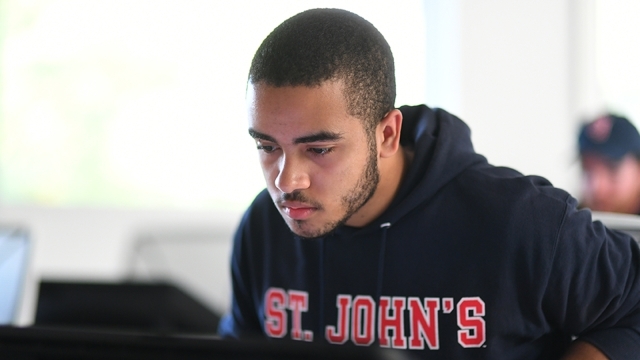

UG
Mathematical Physics, Bachelor of Science
The Bachelor of Science (B.S.) in Mathematical Physics at St. John's University will prepare students with the strong mathematical and theoretical physics training, highly developed quantitative expertise, and keen intellectual curiosity to become experts in quantitative fields, analyzing complex numerical models, applying to real-world problems.
- Home
- Academics
- Majors and Programs of Study
- Mathematical Physics, Bachelor of Science
The Bachelor of Science (B.S.) in Mathematical Physics at St. John's University will prepare students with the strong mathematical and theoretical physics training, highly developed quantitative expertise, and keen intellectual curiosity to become experts in quantitative fields, analyzing complex numerical models, applying to real-world problems.
The Mathematical Physics program offers interdisciplinary courses in Physics and Mathematics, students will have the opportunity to work closely with faculty from both departments. It will also prepare students for future careers requiring analytical and computational qualifications of physical, engineering, biological, and financial industries.
Students in this program are also very likely to further pursue advanced degrees in graduate schools, participate in research projects with faculty in the department, and are in general academia-focused in their future career paths.
- Degree Type
- BS
- Area of Interest
- Science & Mathematics
- Associated Colleges or Schools
- Program Location
- Queens Campus
- Required Credit Hours
- 120
Department Contact
Admission
For more information about admission to this and other acclaimed undergraduate programs at St. John's, please visit Undergraduate Admission.
Courses
The major in Mathematical Physics requires 45 credits in addition to the core requirements, including:
- PHY 1930
- PHY 1940
- PHY 1970
- PHY 2110/2460
- PHY 3210
- PHY 3220
- PHY 3310
- MTH 1730
- MTH 1740
- MTH 2750
- MTH 3840
- CSC 1400
You will also complete three elective courses approved by the department.
Career Outcomes
As a mathematical physicist, you apply mathematics to problems in physics and develop mathematical methods suitable for the formulation of physical theories. A degree in this field prepares you to work as a physicist or mathematician. Physicists study objects in the natural world to determine what they are made of and how they interact with other objects. Mathematicians use calculations to explain the relationships between two objects.
According to the Bureau of Labor Statistics, overall employment of physicists is projected to grow 9 percent from 2018 to 2028, faster than the average for all occupations. Employment of mathematicians, according to the Bureau of Labor Statistics, is projected to grow 26 percent from 2018 to 2028, much faster than the average for all occupations.
Additional Information
Eligible physics students have access to a wide range of academic and professional opportunities through the Sigma Pi Sigma honor society.
Interested in Science & Mathematics, but not sure if Mathematical Physics, Bachelor of Science is right for you?
Related Programs
GR
A Master of Arts in Applied Mathematics, Computing, and Machine Learning will empower you to understand organizational change, assess risks, and make data-driven decisions for a strategic impact. Inquire today!
- Queens Campus
UG
As a Financial Mathematics major, you learn how to develop and evaluate financial models to help companies make business decisions and predictions.
- Queens Campus
UG
The combined Bachelor of Science (B.S.) and Master of Business Administration (M.B.A.) in Mathematical Physics and Business Administration offers highly-motivated students the opportunity to complete both undergraduate and graduate degrees in five years of full-time study.
- Queens Campus
UG
The Department of Mathematics and Computer Science is dedicated to the preparation of students for a dynamic future. Our faculty develop curricula that will challenge your curiosity, employ your inventive facilities, and allow you to enjoy the triumph of discovery. We follow Euclid's rigorous approach to mathematics while exploring modern topics like sustainability.
- Queens Campus
UG
Whether they work in business or private research, computers or government, mathematicians use their knowledge and skills to find practical solutions to real-world problems with a Mathematics degree!
- Queens Campus
UG
Mathematics is the universal language of business, government planning, engineering, and the applied sciences. In today's high-tech workplace, employees with strong math skills are more in demand than ever — and there are excellent opportunities for graduates with a degree in Mathematics.
- Queens Campus

